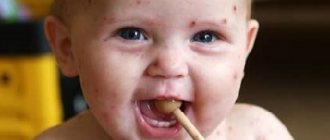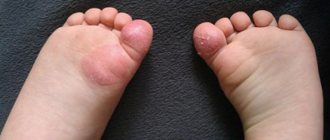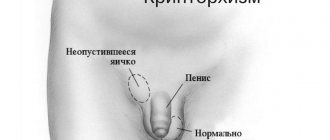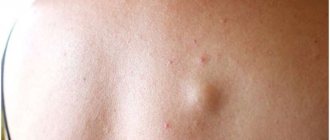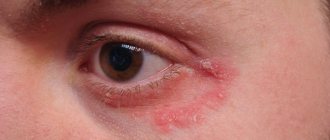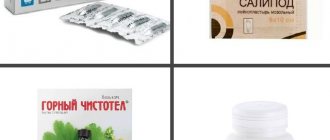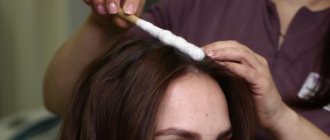Excessive sweating in children sometimes becomes a definite signal that the child has some kind of disease, one of the symptoms of which is hyperhidrosis (local or general increased sweating). If a child is sweating after playing active games or is dressed too warmly, then there is no reason to worry. In this case, profuse sweating is the result of the body's reaction to heat. If a child sweats in a cool room, then it is necessary to exclude various diseases that cause excessive sweating.
Common Causes of Excessive Sweating in Children
The most common causes of sweating in boys and girls are:
- overweight – it is harder for obese children to move than thin children;
- Rickets is a disease that occurs in children due to a lack of vitamin. The disease manifests itself during a period of intensive growth. The disease most affects the bone skeleton. To prevent this disease, long walks in the fresh air, hardening and massage are recommended;
- emotional experiences - if adults experience sweating under the arms or on the palms when excited, then in children this more often manifests itself on the head and neck. If the cause of increased sweating is the child’s fears and worries, then parents should talk to their son/daughter and find out what is bothering him/her;
- genetic predisposition - if one of the relatives in the family sweats, then this problem may also manifest itself in the child. But it’s one thing when sweating occurs in women or men, and another thing when hyperhidrosis manifests itself in a child. Teimur's paste can also help an adult, but children need an integrated approach in treating excessive sweating, because the problem comes down to internal problems in the body.
What to do if your child sweats a lot?
The basic rule is this: if a child is one year old and he is sweating, then he needs to be given a lot of water. It is necessary to try to exclude all possible causes of overheating. But this does not mean that the baby needs to run less. You just need to put it on easier, ventilate the room, and moisten it. The optimal temperature of the room where the baby sleeps and plays should be between 18-20 degrees.
To prevent increased sweating from interfering with the child’s life, parents should begin to harden the child from childhood: pour cold water on him, use a contrast shower.
Sweating causes dehydration, loss of salts, as well as elements such as potassium and sodium. These compounds are needed for normal functioning of the heart, as well as the nervous and immune systems.
Cold sweat and low temperature
Anyone can have a drop in body temperature. Sometimes this condition is accompanied by increased sweating. There are many reasons that cause cold sweat and a drop in temperature. Some of them are natural and safe for health, others require immediate medical attention. But don't panic right away. Check your baby's well-being. Consult a doctor if it is accompanied by parallel symptoms: dizziness, nausea and vomiting, irritability, general malaise.
The most common causes of cold sweats and low temperature include:
- taking popular antipyretic drugs (“Paracetomol”, “Nurofen”, “Ibuprofen”);
- use of drugs from the group of vasoconstrictor drugs;
- viral diseases.
If the baby’s temperature continues to drop, then before the ambulance arrives, you should:
- Wrap the child in a warm blanket, close the windows, and turn on the heater if necessary (the temperature in the room should not fall below 20 degrees).
- Give him hot tea.
- Bed linen and clothes should be dry; if the child is sweating a lot, then change his clothes.
Attention! Cold sweat, along with a low temperature, may also indicate exhaustion. In this case, for a complete recovery, the child needs constant rest and proper nutrition.
Hyperhidrosis in children: symptoms
Pathologically increased sweating in children is called hyperhidrosis. It is not difficult for parents to detect the disease. Mom or dad may notice wet spots on the children's bedding or tactilely feel that their son/daughter has wet hands, wet hair, a red face, wet feet that emit a characteristic odor. To these obvious signs is added a deterioration in mood: due to increased sweating, the baby feels unwell, becomes irritable, overly excitable, and tearful; he has problems with sleep and appetite. Soon other symptoms are added: heat rash, red spots in areas of increased sweating.
What to do
If heavy sweating is not caused by a disease, then parents can solve their child’s sleep problems themselves. First of all, you need to regularly ventilate the nursery half an hour before bedtime and control the temperature.
ATTENTION! An equally important indicator is air humidity. It should fluctuate between 50-60%. If the readings are critically high, a humidifier or hanging wet towels on the radiators will help.
Under no circumstances should you “steam” your child in a lot of diapers and pajamas with blankets chosen out of season. It is worth abandoning synthetic fabrics; instead, calico, linen, satin, and bamboo should prevail in the baby’s clothes and bedding. Wash only using special baby powder and plenty of rinsing. It is better if the underwear does not have bright patterns, and until the age of two, a sweating baby will sleep without a pillow.
How to stop a child from waking up at night?
A number of proven home remedies to combat childhood hyperhidrosis include:
- daily evening swimming - it is recommended to start with a water temperature of 32o, lowering it by 0.5o every day until it drops to 27o. Sea salt, chamomile or string are added to the baths - this calms the child and allows him to fall asleep faster, and wallowing in cool (in moderation!) water helps to harden and strengthen the immune system;
- stabilization of nutrition, including reducing fatty and heavy foods to a minimum. Overeating and late dinners should not be allowed. Instead, you need to accustom your child to fruits and vegetables, boiled or steamed meat. If the child is hungry (which will also prevent him from falling asleep), it is appropriate to give warm milk, kefir or an apple;
- Massages and health-improving gymnastics contribute to the full development and strengthening of muscles. For these purposes, you can hire a competent person or learn all the intricacies yourself;
- stopping active games and watching cartoons 2 hours before bedtime. An emotional jump against the backdrop of such entertainment will prevent the child from falling asleep or make his sleep intermittent and restless. Therefore, it is better to replace such leisure time with reading a book, massage, lullaby or other calm ritual.
An air humidifier will reduce the risk of respiratory diseases, since dry air contributes to the development of influenza and ARVI.
See a doctor for help
If all the tried methods have not solved the problem of profuse night sweats, you should not delay it and urgently need to show your child to the doctor. The initial consultation is provided by a pediatrician. After the examination, schedule tests and refer to a specialized specialist (endocrinologist, neurologist, cardiologist).
When vitamin deficiency is diagnosed, the child is prescribed a course of vitamins and microelements, followed by a repeat examination. It is worth understanding that many diseases are asymptomatic in the initial stages, but the earlier the disease is detected, the easier it will be to treat. Therefore, if the child begins to sweat a lot when he sleeps (and this has not been observed before), nothing prevents you from showing the baby to the doctor for your own reassurance.
Thus, complaints from parents that the child sweats a lot during sleep are not uncommon today. But do not panic ahead of time: in one half of the cases this is a consequence of the external situation, and in the other half - the physiological characteristics of the body. But, if sweating is accompanied by accompanying symptoms such as cough, strong odor, fever, etc., there is a serious reason to think about medical help.
What to do if a young child is sweating?
In order to alleviate the baby’s condition, establish a heat transfer system and stop worrying about their son/daughter, parents should adhere to the following recommendations:
- If the child is sweating, then there is no need to wrap him up and swaddle him.
- You need to monitor the air temperature in the bedroom where the baby sleeps.
- Choose children's clothing, as well as bedding for your baby, from natural fabric.
- It is important to provide the child with normal access to air - ventilate more often, abandon the canopy on the bed and the “bumper” - protection for the crib.
- You need to give your baby water to drink, even if he is only breastfed. The baby needs to be given water from the second month of life.
- It is necessary to monitor the calm atmosphere in the house: constant screams of parents, noise, knocking - all this disrupts the functioning of the baby’s nervous system, he may worry about this, as a result, his body will begin to sweat.
Features of children's thermoregulation
Baby sweating during sleep is more common than many people think. But is this always a problem? All people sweat in their sleep; this process differs only in intensity. In babies, it is observed from the third week and lasts up to three years. In the first months of life, it can be abundant, which is explained by the unformed sweating system, which is fully formed at 5-6 years of age.
Before sounding the alarm, parents should remember that sweat removes toxins and other harmful substances from the body. It is also important that thermoregulation in newborns occurs not so much through the skin (as in adults), but through respiratory functions.
Therefore, nothing should interfere with the infant’s respiratory tract during sleep, the nasal and oral passages should always be clean, and the air in the nursery should be humidified. Pediatricians say that parents of children under 6 years of age often complain of night sweats. It is by crossing this line that the problem is solved through “outgrowing.”
If a child regularly sweats throughout the entire period of sleep, and parents have to change his clothes and change bed linen several times, we are talking about hyperhidrosis - increased sweating. This is a good reason to see a pediatrician.
Excessive sweating in an overweight child
If a child suffers from excess weight, then such a symptom as hyperhidrosis is often observed. To help the child cope with the problem, parents must eliminate the cause of this condition, namely, fight excess weight. How can I do that? The following set of measures will come to the rescue:
- register your child for a sports section (football, Thai boxing, swimming, etc.);
- exclude various sweets, baked goods, and fast food products from the child’s diet. Focus on eating fresh vegetables and fruits;
- regularly take walks with your son/daughter;
- limit your child’s games on the computer, tablet, or phone. The child should play actively: run with a ball, play on the playground with other children, and not sit at home using gadgets;
- parents should pay attention to the child: ask how he spent his day, ask how he is doing in kindergarten, school, walk with him.
Prevention of hyperhidrosis
The emotional state requires attention if sweating in young children is associated with it. It is worth noting that the development of hyperhidrosis can often be prevented. Especially if you don’t overload the kids with additional activities and don’t hope to raise an Olympic champion.
So, in children, emotional stability often depends on the degree of closeness with their parents. Namely, from the willingness of the latter to devote time and support all endeavors. Preventive measures include choosing children's clothing and shoes made from breathable materials. In addition, organizing nutritious meals and teaching hygiene procedures.
Why does a child's head sweat?
In addition to provoking factors that can cause increased sweating of the head (stuffy room, wrapping a child), the causes of increased sweating of the head can be:
- Colds, ARVI, sore throat - sweating of the head is associated with an increase in the child’s body temperature. In addition to hyperhidrosis, the child experiences weakness, passivity, cough, runny nose and other cold symptoms.
- Rickets – there is increased sweating not only of the head, but also hyperhidrosis of the armpits, feet, and palms. Signs of rickets are also deformations in the temporal and frontal bones of the skull, in the chest.
- Allergic reaction to feathers in the pillow, to bathing products. Children with allergies often experience increased sweating on the head.
- Heart failure. Children with this pathology experience cold sweat, shortness of breath, intermittent and rapid breathing, and bluish lips. The disease develops against the background of influenza, anemia or pneumonia.
Signs of childhood hyperhidrosis
It is necessary to distinguish between two forms of child sweating: generalized and local. They develop depending on age.
On a note. In young children, generalized hyperhidrosis associated with body diseases is more common. By the way, local forms are mainly found at school age and in adolescents.
According to local localization, the following signs appear:
- Sweaty palms with constant moisture. At the same time, the palms are noticeably colder than the rest of the body.
- Underarm hyperhidrosis mainly affects schoolchildren. It has noticeable signs in the form of wet circles on the fabric of clothing, the appearance of yellow stains on linen that are resistant to detergents. Also a sure sign is fading of the area under the sleeves on outerwear.
- Excessive sweating of the head. It is characterized by oily hair that occurs immediately after washing your hair. As a result, the hairstyle has an unkempt appearance. If hyperhidrosis affects the face, the skin on it easily turns red and shiny.
- Sweaty feet are easily identified by the unpleasant odor, itching and all the conditions for fungal growth.
Generalized sweating
Generalized forms mean the release of sweat in large quantities throughout the body. The skin is constantly moist, often even hyperemic. Often accompanied by this condition are children’s complaints of headaches. And in addition to temperature fluctuations. Sometimes the skin feels cool to the touch.
Such sweating in a child, the causes of which in generalized forms, is determined by the bed being wet after sleep. And according to the emotional state of the child with characteristic irritability and hot-tempered reactions.
On a note. The immune system in babies is not fully developed, so it is not a barrier to the accelerated proliferation of bacteria on sweaty skin with the appearance of unpleasant odors.
Treatment of hyperhidrosis in children
It is necessary to treat childhood hyperhidrosis competently, making sure to find out the cause of excessive sweating. The principle of treatment for such a problem largely depends on the diagnosis, the symptom of which is hyperhidrosis:
| Causes of excessive sweating in children | Principle of therapy | Treatment |
| Excess body weight | Reduce body weight to normal levels | Diet, increased physical activity |
| Infectious or viral diseases | Treat ARVI, flu and colds in a timely manner to avoid complications | Taking antiviral drugs, vitamins, immunostimulants |
| Rickets | Eliminate vitamin deficiency, normalize phosphorus-calcium metabolism | Taking vitamins, as well as calcium and magnesium supplements, sunbathing |
| Allergy | Eliminate contact with allergens, increase the body's defenses | Taking antihistamines, replenishing calcium deficiency, removing allergens using enterosorbents, drinking more to remove toxins |
| Malfunctions of the nervous system | Eliminate depressive disorders, panic attacks, | Taking sedatives, massage, aromatherapy, healthy lifestyle, taking vitamins and minerals, sedatives |
Consequences
If a child sweats while sleeping, while awake, or even unexpectedly, for no apparent reason, then this should alert any mother. She should ask the doctor why the child is sweating, what could be causing this condition? If parents let this situation take its course, the consequences can be disappointing: dehydration, disruptions in the functioning of the whole body as a result of the loss of a large amount of minerals, fungal skin lesions, psoriasis, as well as psychological problems: isolation, fear of communicating with peers, etc. d.
Doromarin vitamins for children can cope with night sweats, hyperhidrosis of the feet, palms, head or whole body. This therapeutic and prophylactic product is used for the complex treatment and prevention of hyperhidrosis. The complex acts in several directions, helps eliminate the cause of hyperhidrosis, and not only removes the symptoms itself - excessive sweating:
- increases the body's defenses, prevents the occurrence of infectious and viral diseases, due to which a child may develop hyperhidrosis;
- improves metabolism, prevents fat deposition, promotes its rapid breakdown, transforms fat into energy. The complex fights the cause of excess weight, prevents the formation of excessive sweating as a consequence of obesity;
- improves the functioning of the nervous system;
- promotes the elimination of toxins, thereby preventing the risk of allergies;
- has a positive effect on the functioning of the heart, normalizes blood circulation, thereby preventing the occurrence of heart failure - one of the causes of hyperhidrosis.
During sleep
At night, children also develop cold sweat. This happens at any age, even in infants. Most often, this is how the body reacts to overheating (stuffy air, high temperature in the room, too warm blanket). From three weeks of age, infants already respond to changes in room temperature.
Excessive sweating during sleep occurs in excitable children. The nervous system cannot yet cope with the emotional load. The children probably got a lot of impressions during the day and learned a lot of new things.
Sometimes cold sweat in a child during sleep also indicates serious reasons:
- infections caused by viruses (ARVI, influenza);
- stuffy nose and cough;
- fever;
- prolonged exposure to stress.
Attention! Sweating during sleep can also be caused by eating hot, spicy and spicy foods before bed. Even regular, excessively hot tea can cause perspiration.
Features of the Doromarin complex
If your child is sweating, the first thing to do is to find out the cause of hyperhidrosis. But if some difficulties arise with this (it is difficult for a doctor to make a diagnosis, he cannot say exactly what specific cause was the result of hyperhidrosis), then it is advisable to start taking Doromarin. The peculiarity of this product is that it not only relieves the child of the symptoms of hyperhidrosis, but also treats the reason why the child feels unwell. The Doromarin complex works like this:
- improves the functioning of the endocrine, vegetative-vascular, and nervous systems;
- normalizes the process of sweating;
- treats the causes of severe sweating: allergies, nervous disorders, diseases of the central nervous system, endocrine pathologies, etc.;
- increases the body's defenses for an enhanced fight against bacteria and germs, due to which increased sweating may be accompanied by an unpleasant odor;
- normalizes fat, protein and carbohydrate metabolism, thereby preventing the process of fat deposition;
- neutralizes toxic substances entering the children's body;
- improves blood composition, etc.
Doromarin is a natural complex of vitamins for children that create optimal conditions for the normal functioning of the whole body, helping to resist various diseases, including combating excessive sweating.
If you don’t know why your child sweats a lot, according to the test results he should not have any pathologies, then buy him a complex of vitamins for children Doromarin. This therapeutic and prophylactic product will never hurt, but on the contrary, it will help cope with pathological sweating, as well as with other problems that children often suffer from: poor appetite, adenoids, low hemoglobin, decreased immunity, against which various respiratory and viral infections appear. infections.
When should you see a doctor?
In some cases, the problem is caused by dangerous reasons. In this situation, profuse sweating will be one of the additional symptoms of disease. But in each specific case there are leading signs.
Serious causes of cold sweat in a child:
- disturbances in the functioning of the endocrine gland - in addition to cold perspiration, the baby will sharply lose or gain weight, but its diet does not change. The baby also shudders during sleep and smells of ammonia.
- viral infections - a standard set of symptoms includes high body temperature, cough, runny nose, sometimes vomiting and diarrhea, general weakness, irritability, aching joints.
- Signs of rickets in children.
Rickets is a disease associated with disorders of the musculoskeletal system, since the body lacks vitamin D. The disease is usually found in northern regions where there is a lack of sunlight. In most cases, it affects premature babies.
- pathologies of the cardiovascular system - during illness the baby will often get tired. He is away from active games. It is impossible to diagnose pathology without an ultrasound of the heart and a cardiogram.
- hypoglycemia – a drop in blood sugar levels. This is a serious condition in which the baby breaks into a cold, sticky sweat; he also experiences clouding of consciousness, weakness, and dizziness. Hypoglycemia progresses to coma.
- a sharp drop in blood pressure - usually occurs with allergic reactions to irritants.
- hypoxia – with an acute lack of oxygen, both children and adults begin to sweat profusely.
Composition of Doromarin
Vitamins for immunity Doromarin is a universal therapeutic product against hyperhidrosis, excessive sweating and other problems in young patients. The high effectiveness of the natural complex is achieved thanks to its thoughtful composition, which contains:
- Laminaria Angustata is a real treasure, a gift from the sea, thanks to which you can improve the functioning of all organs and systems. If a child has increased sweating, then angustate kelp, which is part of Doromarin, will help normalize the functioning of the sebaceous and sweat glands, strengthen the heart, and eliminate negative phenomena such as lack of appetite, fatigue, and loss of strength. This plant strengthens bone tissue and teeth in children due to large amounts of vitamin D;
- sea cucumber extract – has a powerful antibacterial effect, promotes rapid recovery of the child’s body after illnesses, including hyperhidrosis, fights helminthiasis, vitamin deficiency, bronchitis, laryngitis, asthma, etc.;
- fruit juice – improves the taste of the Doromarin product;
- sea calcium - saturates the child’s body with calcium, necessary for children during growth, during rehabilitation after an illness, as well as for everyone who lives in environmentally unfavorable areas, in large cities;
The complex also contains vitamins, micro- and macroelements, polysaccharides, which enhance the effect of the main components of the vitamin complex, improve the functioning of the immune system, improve sleep, increase the child’s physical performance, etc.
Doromarin is an indispensable assistant for a growing child's body. See for yourself the quality of this product, read reviews about hyperhidrosis and the successful treatment of this disease:
You can buy Doromarin with free delivery throughout Kazakhstan.
BUY DOROMARINE

